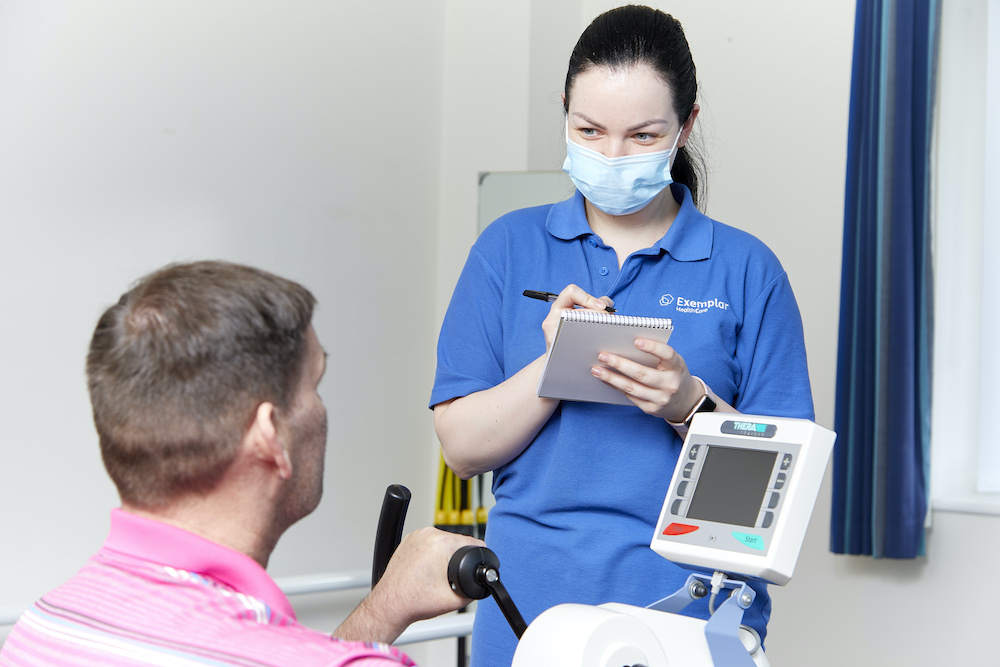
Working as a physiotherapist in social care is an extremely rewarding role. You’ll often be based in the same home, and work with the same people over a period of time. This means you can really get to know them and see the difference you make each and every day.
Exemplar Health Care is a specialist nursing care provider supporting younger adults living with complex needs. Here, they share what makes a physiotherapy role in care so rewarding
At Exemplar Health Care, we support adults, many of whom are of working age, living with complex care needs. This includes those recovering from spinal injuries or brain injuries, people living with neuro-disabilities and dementia, and those who require respiratory care.
A big focus of our care is supporting people to build their everyday living skills and maintain their independence.
As a physiotherapist in social care, your role will involve providing specialist assessments, clinical diagnoses and interventions to support people to maintain optimal muscle function, limit/delay deterioration and regain movement and mobility where possible.
You’ll often work as part of a small therapy team in one of our specialist nursing homes. Our homes are relatively small in size, usually with around 30 service users, which means that you’ll have sufficient time to make a real difference to the lives of those in your care.
You’ll see the difference you make each and every day, which provides great job satisfaction.
Hear from Helen, physiotherapist at Tyne Grange
Helen works as a physiotherapist at Tyne Grange care home in Newcastle upon Tyne. She moved into the social care sector from private practice, and loves the person-centred nature of working in a care home. Here, she shares what she loves about her role.
Learn more here: https://vimeo.com/manage/videos/580210059
“My day to day job is a full time physiotherapist at Tyne Grange, and I also lead the therapy team in the home. I work in a small team which includes myself, an occupational therapist, a therapy assistant and two activities coordinators,” she says.
“My background is in muscular-skeletal physio. I qualified around 11 years ago and have spent most of my career in private practice. Before starting at Tyne Grange, I spent a few years working in neuro-rehab units and care homes alongside my other work. During this time, I found myself gravitating more towards neuro-physio.
“I loved the look of the job of physiotherapist at Tyne Grange and have been working here since the home opened in 2020.”

A typical day as a physiotherapist in a care home
“Tyne Grange supports adults living with complex needs arising from conditions and disabilities such as neuro-disabilities, brain injuries and spinal injuries,” says Helen.
“Typically, I have five or six physiotherapy sessions each day, which are normally up to an hour long.
“I assess and provide treatment for anybody who has physical needs. If someone has had a life changing injury, we’ll support their rehabilitation journey. A couple of our service users are bed-bound so we do maintenance therapy with them. We also do group exercise classes to make things fun.
“As a therapy team, we advise on all moving and handling around the home including falls assessments, equipment, hoisting and splints.
“We’re also responsible for organising meaningful activities that promote the skills development of our service users.
“The people who live at Tyne Grange tend to be younger adults who are keen to go out into the community, so we facilitate that too.”
Working as a physiotherapist in social care
“My favourite thing about the role is getting to know our service users and providing that ongoing and consistent physiotherapy service in their home,” she continues.
“I like the variety in my role. I support people with a wide range of needs and conditions – including those who’ve experienced a brain or spinal injury, and those who are independently mobile but would just like a little more support in their day to day living. It’s unusual to get all of that into one job.
“In this role, you can make a big difference to people’s lives. You’re responsible for improving their quality of life and empowering them to be more independent. It’s extremely rewarding.
 “My other favourite thing is that I can bring my therapy dog, Indie, into work. She comes in once a week to see our service users and absolutely brightens up their day. Indie loves it, the service users love it and it just lifts the atmosphere in the home.”
“My other favourite thing is that I can bring my therapy dog, Indie, into work. She comes in once a week to see our service users and absolutely brightens up their day. Indie loves it, the service users love it and it just lifts the atmosphere in the home.”
Challenges of the role
“The biggest challenge in the role is learning how to support people who display behaviours of concern,” adds Helen.
“As a physiotherapist, you’re not traditionally taught this area of care.
“However, when you start with Exemplar Health Care, you complete Exemplar Positive Behaviour Support Training (EPBS) as part of induction, which equips you with the right knowledge and skills.
“You’re always supported by an in-house team of Registered Nurses and you have access to online learning modules 24/7.”
Physiotherapist jobs in social care
Read more about working as a Physiotherapist in social care or apply for a role with Exemplar Health Care on our online job search.








